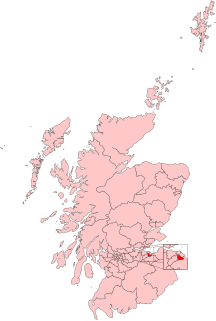Related Research Articles

Edinburgh South is a constituency of the House of Commons of the UK Parliament created in 1885. The constituency has been represented by the Labour Party's Ian Murray since 2010. Murray was the only Labour MP in Scotland to retain his seat at the 2015 general election, and did so with an increased majority, where he result rendered it the 23rd-most marginal Labour seat by percentage of majority nationwide.

Edinburgh West is a burgh constituency of the House of Commons of the Parliament of the United Kingdom, first used at the 1885 general election.

Edinburgh East is a burgh constituency of the House of Commons of the Parliament of the United Kingdom. It elects one Member of Parliament (MP) by the first past the post system of election.

Edinburgh Central was a burgh constituency of the House of Commons of the Parliament of the United Kingdom from 1885 to 2005. It elected one Member of Parliament (MP) by the first past the post system of election.
Glasgow Partick was a burgh constituency represented in the House of Commons of the Parliament of the United Kingdom from 1918 until 1950.
Glasgow Maryhill was a parliamentary constituency represented in the House of Commons of the Parliament of the United Kingdom from 1918-2005 when it was subsumed into the new Glasgow North and Glasgow North East constituencies. It elected one Member of Parliament (MP) using the first-past-the-post voting system.
The 1895 municipal election was held January 14, 1895 to elect the town council and four trustees for each of the public and separate school divisions. This was the first election in Edmonton history in which there was a contested race for mayor, and also the first during which school trustee elections were held concurrently with those for town council.

Robert J. Cox FRSE was a Scottish gelatine and glue manufacturer and Liberal Unionist politician.

An Election to the Edinburgh Corporation was held on 3 November 1936, alongside municipal elections across Scotland. The election took place midst an increasingly sectarian political climate, with hardline Protestant and anti-Catholic political parties being on the rise in Glasgow and Edinburgh in the 1930s. The Protestant Action Society (PAS); Edinburgh's far-right Protestant grouping which had inspired a sectarian riot the previous year, won 31% of the vote and got 5 new members elected. The PAS had won 24% in the previous years election.

Local elections were held in Scotland in 1973, as part of that years wider British local elections.

An Election to the Edinburgh Corporation was held on 6 November 1894, alongside municipal elections across Scotland, and the wider British local elections. Elections took place in 5 of the cities 13 wards, with candidates in the remaining 8 being returned unopposed. A candidate, Thomas Blake, had intended to run against incumbent Lord Provost James Russell in St Cuthbert's Ward; however, due to a mistake at the nomination, Blake could not be accepted as a candidate.
An Election to Leith Burgh Council was held on 6 November 1894, alongside municipal elections across Scotland, and the wider British local elections. Contests took place in 3 of the burghs 6 wards, with candidates in the remaining 3 being returned unopposed.
Elections to Liverpool City Council were held on Thursday 1 November 1895. This was an 'all up' election following boundary changes which extended the area of the city and increased the number of wards from 16 to 28. Three councillors were elected for each ward. The candidate with the most votes was elected for three years, the candidate with the second highest number of votes was elected for two years and the candidate with the tthird highest number of votes was elected for one year.
An Election to the Edinburgh Corporation was held on 2 November 1897, alongside municipal elections across Scotland, and the wider British local elections. Contests took place in 5 of the cities 13 wards, with candidates in the remaining 8 being returned unopposed. Three Portobello wards also held elections. The election was relatively quiet, with no particularly important issues being raised. As a result, the main focus of the election was on the Lord Provost, and the personalities of the individual candidates.
Election for Edinburgh Corporation were held on Tuesday 3 November 1896, alongside municipal elections across Scotland, and the wider British local elections. The election was relatively quiet, with no particularly important issues being raised, and contests took place in only 2 of the cities 13 wards, with candidates in the remaining 11 being returned unopposed.
An Election to the Edinburgh Corporation was held on 3 November 1919, alongside municipal elections across Scotland.
An Election to the Edinburgh Corporation was held on 2 November 1920, alongside municipal elections across Scotland. The election was the first following the absorption of Leith and parts of the Edinburgh suburbs into Edinburgh Corporation. The area previously comprising Edinburgh Corporation continued to return 50 members, and Leith returned 12, and the new suburbs 9. The new Edinburgh Corporation therefore had a total of 71 members. There were contests in 12 of the 16 wards, and the election saw Labours total representation for Edinburgh & Leith reduced from 7 to 4.

The Boston mayoral election of 1895 occurred on Tuesday, December 10, 1895. Democratic candidate Josiah Quincy defeated Republican candidate and incumbent Mayor of Boston Edwin Upton Curtis, and one other contender, to win election to his first term.
References
- 1 2 3 4 "The Municipal Elections: Edinburgh". The Glasgow Herald. 6 November 1895. p. 8.